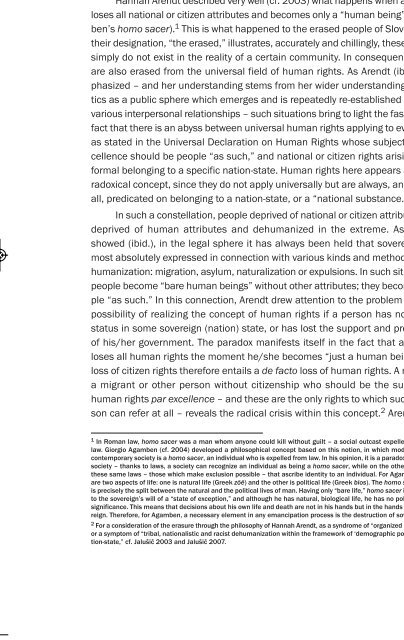The Scars of the Erasure_web
The Scars of the Erasure_web
The Scars of the Erasure_web
- No tags were found...
Create successful ePaper yourself
Turn your PDF publications into a flip-book with our unique Google optimized e-Paper software.
<strong>Erasure</strong>_4a 10.1.11 20:29 Page 258258 THE SCARS OF THE ERASUREco-creates his/her identity and proves it in socio-political, <strong>of</strong>ficial and legal contexts,is destroyed in front <strong>of</strong> his/her eyes? What can such a person do, one whohas been expelled from <strong>the</strong> <strong>of</strong>ficial, legal and socio-political system <strong>of</strong> a countryand has all <strong>of</strong> a sudden become just a “human being”?Hannah Arendt described very well (cf. 2003) what happens when a personloses all national or citizen attributes and becomes only a “human being” (Agamben’shomo sacer). 1 This is what happened to <strong>the</strong> erased people <strong>of</strong> Slovenia. As<strong>the</strong>ir designation, “<strong>the</strong> erased,” illustrates, accurately and chillingly, <strong>the</strong>se peoplesimply do not exist in <strong>the</strong> reality <strong>of</strong> a certain community. In consequence, <strong>the</strong>yare also erased from <strong>the</strong> universal field <strong>of</strong> human rights. As Arendt (ibid.) emphasized– and her understanding stems from her wider understanding <strong>of</strong> politicsas a public sphere which emerges and is repeatedly re-established throughvarious interpersonal relationships – such situations bring to light <strong>the</strong> fascinatingfact that <strong>the</strong>re is an abyss between universal human rights applying to everyone,as stated in <strong>the</strong> Universal Declaration on Human Rights whose subject par excellenceshould be people “as such,” and national or citizen rights arising fromformal belonging to a specific nation-state. Human rights here appears as a pa -radoxical concept, since <strong>the</strong>y do not apply universally but are always, and aboveall, predicated on belonging to a nation-state, or a “national substance.”In such a constellation, people deprived <strong>of</strong> national or citizen attributes aredeprived <strong>of</strong> human attributes and dehumanized in <strong>the</strong> extreme. As Arendtshowed (ibid.), in <strong>the</strong> legal sphere it has always been held that sovereignty ismost absolutely expressed in connection with various kinds and methods <strong>of</strong> dehumanization:migration, asylum, naturalization or expulsions. In such situations,people become “bare human beings” without o<strong>the</strong>r attributes; <strong>the</strong>y become people“as such.” In this connection, Arendt drew attention to <strong>the</strong> problem and impossibility<strong>of</strong> realizing <strong>the</strong> concept <strong>of</strong> human rights if a person has no citizenstatus in some sovereign (nation) state, or has lost <strong>the</strong> support and protection<strong>of</strong> his/her government. <strong>The</strong> paradox manifests itself in <strong>the</strong> fact that a personloses all human rights <strong>the</strong> moment he/she becomes “just a human being:” <strong>the</strong>loss <strong>of</strong> citizen rights <strong>the</strong>refore entails a de facto loss <strong>of</strong> human rights. A refugee,a migrant or o<strong>the</strong>r person without citizenship who should be <strong>the</strong> subject <strong>of</strong>human rights par excellence – and <strong>the</strong>se are <strong>the</strong> only rights to which such a personcan refer at all – reveals <strong>the</strong> radical crisis within this concept. 2 Arendt also1 In Roman law, homo sacer was a man whom anyone could kill without guilt – a social outcast expelled from civillaw. Giorgio Agamben (cf. 2004) developed a philosophical concept based on this notion, in which modern man incontemporary society is a homo sacer, an individual who is expelled from law. In his opinion, it is a paradox <strong>of</strong> modernsociety – thanks to laws, a society can recognize an individual as being a homo sacer, while on <strong>the</strong> o<strong>the</strong>r hand, it is<strong>the</strong>se same laws – those which make exclusion possible – that ascribe identity to an individual. For Agamben, <strong>the</strong>reare two aspects <strong>of</strong> life: one is natural life (Greek zōē) and <strong>the</strong> o<strong>the</strong>r is political life (Greek bios). <strong>The</strong> homo sacer effectis precisely <strong>the</strong> split between <strong>the</strong> natural and <strong>the</strong> political lives <strong>of</strong> man. Having only “bare life,” homo sacer is subjectedto <strong>the</strong> sovereign’s will <strong>of</strong> a “state <strong>of</strong> exception,” and although he has natural, biological life, he has no political life orsignificance. This means that decisions about his own life and death are not in his hands but in <strong>the</strong> hands <strong>of</strong> <strong>the</strong> sove -reign. <strong>The</strong>refore, for Agamben, a necessary element in any emancipation process is <strong>the</strong> destruction <strong>of</strong> sovereignty.2 For a consideration <strong>of</strong> <strong>the</strong> erasure through <strong>the</strong> philosophy <strong>of</strong> Hannah Arendt, as a syndrome <strong>of</strong> “organized innocence,”or a symptom <strong>of</strong> “tribal, nationalistic and racist dehumanization within <strong>the</strong> framework <strong>of</strong> ‘demographic politics’ <strong>of</strong> nation-state,”cf. Jalušič 2003 and Jalušič 2007.


